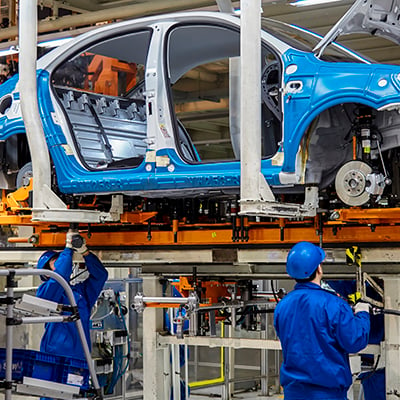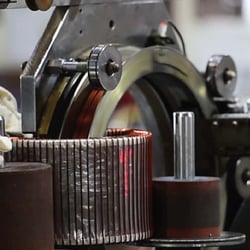Your transformation project should boost performance, competitive advantage, and margins without becoming a distraction.
Automotive manufacturers – including OEMs and tier suppliers – look to digital transformation to meet the high-performance targets required to satisfy customers, win new business, and do more than operate profitably. It doesn’t matter what your transformation motivation is, if the project stalls or fails, it can cost your company much more than just the price tag for licenses or services.
Automotive industry manufacturers face tough challenges every day
Nearly every company in the automotive sector — car manufacturing, automotive parts manufacturing, commercial vehicle parts manufacturing, and tire manufacturing — faces complex quality and performance demands:
- Operate at peak performance
- Boost problem-solving capabilities
- Address customer-specific requirements
- Navigate complex and redundant quality management systems (QMS) requirements
- Apply collaborative and effective product development methods and solutions
- Protect against loss of experience as highly skilled workers retire
Whether you’re poised for the next stage of the performance race, or seeking crisis management to bring quality and operations up to contract standards, you face complex and competing priorities and pressures. OEMs and tier suppliers are eager to build on what the automotive industry has already achieved – some of the highest quality levels in the industry, record vehicle volumes, and a vision to meet ever-increasing quality and performance demands:
- Reduce waste in production and processes
- Reduce downtime, increase OEE, and achieve optimal production scheduling
- Deliver safe, high-quality parts and products quickly
- Achieve OEM and regulatory compliance and avoid product recalls
- Increase problem-solving capabilities to manage, monitor, and respond to quality-related events
- Evaluate and prioritize operational efficiency opportunities
- Standardize and institutionalize processes and systems to meet disparate quality management system (QMS) requirements
- Collect and democratize data from manufacturing equipment and processes to contribute to Design in Quality, Design for Manufacturability and Design for Six Sigma
- Make data and analytics intuitive and accessible to all the right people when they need it most
- Establish processes and systems to capture and apply tribal knowledge from retiring workforce to ease or eliminate the impact of loss of experience
- Ensure your processes and products are consistent, no matter where they're made
- Address and ease complexity in production and business processes
- Choose the right technologies to serve the business while attracting younger, digitally savvy workers
Every automotive manufacturing company experiences and responds to industry pressures differently
Car and light truck manufacturing, automotive parts manufacturing, commercial vehicle parts manufacturing, and tire manufacturing have vastly different pressures, resources, and capabilities.
Tier 1 Automotive Suppliers
Most Tier 1s worry about the supply chain and their ability to get the right parts and raw materials needed at the right time, in the correct quantities, and at the right price to meet their own CSRs. Adding to the pressure, OEMs have reduced the number of Tier 1 vendors to favor larger, more tech-ready companies with global manufacturing capabilities. That means the typical Tier 1 enjoys a more balanced book of business than other automotive suppliers, but at a steep price. Customer service requirement variations among the many OEMs drive up complexity and cost. While quality is critical to every OEM’s business, unique customer service requirements also contribute to competitive advantage. For Tier 1 suppliers, the complexity associated with OEM CSRs can be quite difficult.
Job Shops
Job shops that supply Tier 1s and Tier 2s might be cash-constrained and lack the resources to implement quality, MES, production scheduling, and other critical solutions they need to meet customer and regulatory requirements. They may also lack the continuous improvement focus needed to keep pace and compete effectively. These automotive manufacturing companies are likely overwhelmed by the complexity of multi-level CSRs and struggle to keep pace with volume and quality demands.
Automotive OEMs
Despite their size and ability to implement modern solutions, even OEMs worry about the implications of not meeting today’s top challenges head-on, particularly where less-than-exceptional problem-solving impacts customer expectations and relationships. Focus on the shifting regulatory environment may mean they have to reconfigure the supply chain. A possible shift in the economic climate, shifting brand loyalty, variable supply of used vehicles, and rapidly changing consumer preferences all mean that car makers must do everything possible to protect the brand, respond to demand changes, and ensure profitability.
Automotive industry manufacturers trust On Time Edge for digital transformation
Our people know automotive industry manufacturing. And that’s exactly why we invest the time to fully understand your unique ecosystem of manufacturing processes, business processes, IT-OT architecture, and most importantly, your culture. We design, build, and integrate your system to fit your situation. Then we train, support, and empower your team to get the results you expect.
Get the value you expect from digital transformation, quickly and sustainably.
Digital transformation is our business. We are experts at deploying and integrating supply chain solutions and smart manufacturing systems – on time and within budget. The result is fast time-to-value and sustainable business value.












